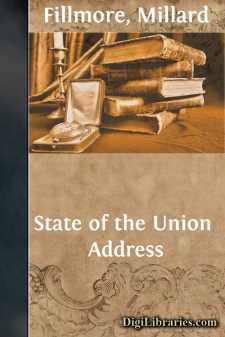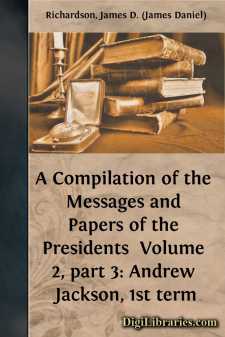History
- Africa 30
- Americas (North Central South West Indies) 50
- Ancient 68
- Asia 58
- Australia & New Zealand 8
- Canada 41
- Caribbean & West Indies 1
- Civilization 20
- Eastern Europe 12
- Europe 310
- Expeditions & Discoveries 60
- General 77
- Historical Geography 1
- Jewish 9
- Latin America 3
- Medieval 8
- Middle East 13
- Military 248
- Revolutionary 8
- Study & Teaching 5
- United States
- Western Europe 56
- World 13
United States Books
Sort by:
by:
Grover Cleveland
To the Congress of the United States: Your assembling is clouded by a sense of public bereavement, caused by the recent and sudden death of Thomas A. Hendricks, Vice-President of the United States. His distinguished public services, his complete integrity and devotion to every duty, and his personal virtues will find honorable record in his country's history. Ample and repeated proofs of the...
more...
by:
Franklin Pierce
Fellow-Citizens of the Senate and of the House of Representatives: The interest with which the people of the Republic anticipate the assembling of Congress and the fulfillment on that occasion of the duty imposed upon a new President is one of the best evidences of their capacity to realize the hopes of the founders of a political system at once complex and symmetrical. While the different branches of...
more...
by:
Jacob Stroyer
CHAPTER I. My father was born in Sierra Leone, Africa. Of his parents and his brothers and sisters I know nothing. I only remember that it was said that his father's name was Moncoso, and his mother's Mongomo, which names are known only among the native Africans. He was brought from Africa when but a boy, and sold to old Colonel Dick Singleton, who owned a great many plantations in South...
more...
by:
Millard Fillmore
Fellow-Citizens of the Senate and of the House of Representatives: Being suddenly called in the midst of the last session of Congress by a painful dispensation of Divine Providence to the responsible station which I now hold, I contented myself with such communications to the Legislature as the exigency of the moment seemed to require. The country was shrouded in mourning for the loss of its venerable...
more...
ANDREW JACKSON Andrew Jackson was born in the Waxhaw Settlement, North or South Carolina, on the 15th of March, 1767. He was a son of Andrew Jackson, an Irishman, who emigrated to America in 1765 and died in 1767. The name of his mother was Elizabeth Hutchinson. There is little definite information about the schools that he attended. According to Parton, "He learned to read, to write, and cast...
more...
by:
Various
INTRODUCTION. The documents herewith presented are printed from copies obtained from the Public Record Office of Great Britain. When the question of the boundary line between Maryland and Virginia was before the Legislature of the latter State, in 1860, Colonel Angus W. McDonald was sent to England to obtain the papers necessary to protect the interests of Virginia. He brought back "nine volumes of...
more...
ARMY LETTERS FROM AN OFFICER'S WIFE KIT CARSON, COLORADO TERRITORY, October, 1871. IT is late, so this can be only a note—to tell you that we arrived here safely, and will take the stage for Fort Lyon to-morrow morning at six o'clock. I am thankful enough that our stay is short at this terrible place, where one feels there is danger of being murdered any minute. Not one woman have I seen...
more...
Introduction In the annals of adventure, there are no more thrilling narratives of heroic perseverance in the performance of duty than the record of Spanish exploration in America. To those of us who have come into possession of the fair land opened up by them, the story of their travels and adventures have the most profound interest. The account of the expedition of Portolá has never been properly...
more...
by:
Zachary Taylor
Fellow-Citizens of the Senate and House of Representatives: Sixty years have elapsed since the establishment of this Government, and the Congress of the United States again assembles to legislate for an empire of freemen. The predictions of evil prophets, who formerly pretended to foretell the downfall of our institutions, are now remembered only to be derided, and the United States of America at this...
more...
INTRODUCTORY. All authorities are agreed that the political history of the United States, beyond much that is feeble or poor in quality, has given to the English language very many of its most finished and most persuasive specimens of oratory. It is natural that oratory should be a power in a republic; but, in the American republic, the force of institutions has been reinforced by that of a language...
more...











